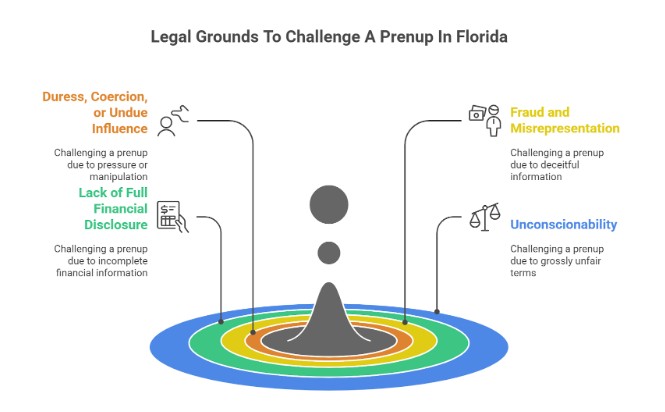
- Call for a
Confidential Consultation - 954-587-2244
- Email Us
-

Originally published: October 2025 | Reviewed by Scott A. Levine

You can challenge a prenuptial agreement in Florida if certain conditions exist. Florida law allows you to contest a prenuptial agreement when it was created unfairly, signed under questionable circumstances, or doesn’t meet legal standards.
The state uses the Uniform Prenuptial Agreement Act, which outlines the circumstances under which these agreements can be challenged in court.
Lots of people think prenups are unbreakable contracts, but that’s not always true. This myth sometimes leaves spouses feeling stuck with agreements they signed in a rush or without proper legal help.
If you know when and how to challenge a prenuptial agreement, you can protect your finances and receive a fair settlement during divorce.
Challenging a prenuptial agreement in Florida requires substantial evidence and a well-planned approach.
You’ll need to demonstrate that the deal doesn’t meet legal standards or was created in an unethical manner.
A family law attorney can review your situation and guide you through the process, which can become complicated quickly.

Florida courts judge prenuptial agreements by examining factors such as proper paperwork, voluntary consent, and whether both parties provided sufficient financial information.
These rules aim to ensure that no one is being tricked or forced into anything.
Florida Statute § 61.079 outlines the requirements for a valid prenuptial agreement in Florida. You both have to sign the written agreement before you’re married, or it’s not legally binding.
The law also says you can’t use a prenup to decide child support. Florida forbids prenups from making child support decisions because kids have their own rights.
Prenuptial agreements cannot waive child custody rights either. The state wants to protect children, regardless of what their parents agree to.
Courtrooms really care if both people signed the prenup willingly, without threats or pressure. Duress and coercion are the top reasons courts toss out prenups.
Common signs of invalidity:
The agreement also needs to be fair when you sign it. If the terms are crazy one-sided, courts might refuse to enforce them.
Fairness factors include:
Each person must disclose all their assets and debts before signing a prenuptial agreement. Hiding stuff is a fast track to getting the whole thing thrown out.
Required disclosures include:
| Assets | Liabilities |
| Bank accounts | Credit card debt |
| Real estate | Student loans |
| Investment accounts | Mortgages |
| Business interests | Personal loans |
| Retirement funds | Tax obligations |
If someone hides big assets or debts, the court might toss the prenup. You should back up your disclosures with real financial records.
Vague statements like “I have substantial assets” are usually insufficient. The details really matter here.
Florida courts consider several factors to determine if a prenuptial agreement is enforceable. Here’s a checklist to help you cover your bases.
Essential validity requirements:
Documentation best practices:
Considering a divorce in Florida and worried about your prenuptial agreement? Levine Family Law offers clear guidance in divorce litigation. Protect your future—contact us today to discuss your case.
If you’re ready to get started, call us now!

A prenuptial agreement (prenup) can be challenged if it was signed under duress, involved fraud or misrepresentation, lacked full disclosure, or contained unconscionable terms.
Duress and coercion are among the most common reasons Florida courts toss out prenups. That’s when someone’s pressured or forced into signing something they don’t really agree with.
Common examples of duress include:
Judges want to know if the person really had a choice. If you felt like you had no other option, that’s a red flag for the court.
Key factors courts consider:
If you’re challenging a prenuptial agreement, you need to demonstrate that you signed under serious pressure. Just feeling rushed or awkward probably won’t cut it.
Fraud occurs when someone misrepresents important information to induce the other person to sign. That could mean straight-up lying, or hiding things that really matter.
Types of fraud that void prenups:
The lie has to be a significant issue—something that really influenced the decision to sign. Little mistakes or exaggerations probably won’t get the whole thing tossed.
Courts also check if the other person could have figured out the truth before signing. If you had the chance to ask questions or review the numbers, it might be harder to claim fraud.
Florida law requires both parties to disclose their complete financial information before signing a prenuptial agreement. That means assets, debts, income, and business interests—all of it.
Required disclosures include:
Some people waive this requirement, and that’s legal in Florida. However, you must do it knowingly and willingly.
If someone didn’t disclose everything and there was no proper waiver, the prenup could be invalid.
You’ll need to show that hidden assets or debts would have changed your mind about signing.
Courts look at whether:
Unconscionable terms are so unfair that no reasonable person would ever agree to them. Florida courts can invalidate prenuptial agreements with provisions that genuinely shock the conscience.
Procedural unconscionability deals with unfair bargaining processes.
Substantive unconscionability examines the actual consequences of the agreement.
Courts examine the circumstances surrounding the signing of the prenup and the actual terms it contains.
If an agreement creates extreme hardship for one party and confers a significant benefit on the other, this definitely raises red flags.
What might signal unconscionable terms?
If you want to challenge a prenuptial agreement, you must follow specific legal steps and meet strict deadlines during divorce proceedings. You’ll need to file court documents, bring strong evidence, and show exactly why the agreement shouldn’t stand.
You can challenge a prenup at any point during your divorce if you’ve got valid legal reasons. The challenge becomes part of your divorce case.
An attorney typically assists in preparing and filing a petition with the court to contest the prenuptial agreement. The petition must clearly state why the agreement should be rejected.
The filing must include detailed reasons—such as fraud, duress, or lack of disclosure—not just vague complaints about unfairness.
Key Filing Requirements:
Evidence is everything in a prenup challenge. Courts examine all the evidence before deciding whether to enforce the agreement.
| Evidence Type | Purpose | Examples |
| Financial Documents | Show hidden assets or lack of disclosure | Bank statements, tax returns, business records |
| Communications | Reveal duress or coercion | Emails, texts, and recorded conversations |
| Witness Testimony | Give firsthand accounts | Family, friends, and attorneys present at signing |
| Medical Records | Show mental incapacity | Psychological evaluations, medication records |
Email exchanges often show pressure tactics or threats. Texts sometimes reveal that someone is hiding assets or making false promises about what’s in the prenuptial agreement.
Financial documents can prove whether both parties actually disclosed all their assets and debts. If information is missing or incomplete, it can undermine the entire agreement.
Expert witnesses sometimes testify about the fairness of the agreement or whether the proper legal steps were followed.
If you challenge a prenuptial agreement, you have the burden of showing that it shouldn’t be enforced. That means you need convincing evidence that the legal requirements weren’t met.
Florida courts apply strict scrutiny to these challenges. Judges start by assuming the agreement is valid until you prove otherwise.
Standard Legal Tests:
Judges scrutinize closely how the prenup was signed—specifically, the timing, the level of legal assistance, and whether everyone fully understood the consequences of the agreement.
You must prove your case with clear and convincing evidence, a higher standard than most civil cases.
Challenging a prenuptial agreement typically takes several months, depending on the case’s complexity and the court’s workload. The process often runs alongside the divorce itself.
Cases involving numerous assets or complex legal issues can take longer to resolve. If the challenge is straightforward, it may be decided relatively quickly.
Settlement negotiations often happen throughout. Sometimes, once both sides see the evidence, they settle before trial.
Court hearings on specific issues may be scheduled before the main trial to narrow down the issues.
If you’re unsure whether your prenuptial agreement is enforceable, Levine Family Law provides dedicated support in family law matters. Don’t leave your rights unprotected—schedule a consultation with us now.
If you’re ready to get started, call us now!
Lots of people think prenups are bulletproof and can’t be challenged, but that’s just not true.
There are numerous myths surrounding challenging prenuptial agreements in Florida, including who they protect and when they are considered valid.
This myth makes people accept unfair deals without even asking questions. Florida courts can void prenups if there are valid legal reasons.
Some common reasons for challenging a prenup:
Courts look at each case individually. They focus on the circumstances at signing and whether the terms are fair.
If you want to challenge a prenup, you’ll need evidence showing why it shouldn’t be enforced.
People often think prenups just help the richer partner, but that’s not really accurate. Prenuptial agreements can actually protect both parties, regardless of their financial situation.
Middle-class couples often use prenuptial agreements to protect family businesses or inherited property. They also spell out who’s responsible for debts and what to expect with spousal support.
Common protections for both spouses:
| Protection Type | Examples |
| Separate Property | Family heirlooms, inherited assets |
| Business Interests | Professional practices, small businesses |
| Debt Protection | Student loans, credit card debt |
| Support Terms | Alimony duration and amounts |
It’s the fairness of the agreement that matters, not who has more money. Terms that break state laws can be challenged, no matter which spouse benefits.
Courts ensure that both sides receive fair treatment and consider each person’s unique situation.
This myth is risky—it leads people to accept pressure during prenup talks. Duress or coercion is one of the top reasons courts throw out prenups.
What counts as pressure or coercion?
Timing is a big deal here. Judges consider when the prenup was presented and whether everyone had sufficient time to review it.
Pressure doesn’t have to be physical. Emotional manipulation or not giving enough time can also be invalid.
Each spouse should have their own lawyer. It’s essential to take the time to review the terms and truly understand what’s at stake before signing.
If the court enforces a prenuptial agreement, there are still ways to address unfair financial setups.
You can adjust terms for child support, spousal support, and asset division through legal channels or negotiation.
Mediation offers couples a cost-effective way to negotiate changes to their financial arrangements, even if the prenuptial agreement remains in effect.
A neutral mediator helps both sides talk through concerns about alimony, dividing property, and support payments.
Mediation can’t change the prenup itself, but it allows couples to make new agreements regarding money and property.
It’s also helpful in sorting out child-related expenses. Prenuptial agreements can’t set child support amounts—courts always prioritize children’s best interests.
Mediation usually takes 2-6 sessions. Both spouses can bring their attorneys to double-check any new deals before signing.
Postnuptial agreements enable married couples to establish new financial arrangements or modify an existing prenuptial agreement.
These contracts have to meet the same legal standards as prenuptial agreements.
Key requirements for valid postnuptial agreements:
Sometimes the original prenup misses things, and postnuptial agreements step in to cover those gaps.
Couples often use them to sort out spousal support, divide assets acquired during marriage, or clarify business ownership.
Both parties must agree on any changes. No court will ever force someone to sign a postnuptial agreement.
Once both spouses sign and all necessary documents are in order, these agreements become legally binding. If there’s a conflict with the old prenuptial agreement, the new agreement takes precedence.
Courts sometimes intervene and modify prenuptial agreements, but only in specific cases. This typically occurs around child custody or support, especially when life throws a curveball.
Common situations for court adjustments:
Child support remains open to court review. Parents can’t use prenups to dodge state child support rules.
If a spouse ends up disabled or in real trouble, courts might tweak spousal support, but that’s pretty rare and takes solid proof.
Changing how property is divided is tough—judges only intervene if adhering to the prenup would leave someone in serious financial trouble.
Contesting a prenuptial agreement in Florida means you need to know the legal grounds and the right steps to take.
People usually succeed only when they can demonstrate that there was fraud, coercion, or that the agreement was significantly one-sided.
Key factors that strengthen challenges include:
Courts want to ensure that both parties understand what the agreement would mean for their rights. Florida law lets courts review and throw out prenups if they were made under shady or unfair circumstances.
Estate planning also comes into play. These agreements often shape who gets what after someone passes away.
If you want to challenge a prenup, you should prepare and gather solid evidence. Judges in Florida set a high standard for overturning a signed agreement.
Receiving assistance from a skilled lawyer can make a significant difference. Every situation is a little different, so it pays to have someone carefully review your case.
Timing can make or break these challenges. If you wait too long after spotting a problem, your chances of winning drop fast.
When it comes to challenging a prenuptial agreement, timing and strategy are crucial. Levine Family Law handles prenup challenges with care. Take the first step toward peace of mind—contact us today.
Can you challenge a prenup in Florida?
Yes. You can challenge a prenuptial agreement in Florida if it was signed under duress, involved fraud or misrepresentation, lacked full financial disclosure, or included unconscionable terms. Florida courts review both the validity of the agreement and its fairness before deciding enforceability.
What are the valid grounds to contest a prenuptial agreement in Florida?
The most common grounds include duress or coercion, fraud, misrepresentation, lack of financial disclosure, and grossly unfair (unconscionable) terms. Each case is fact-specific, and the burden is on the challenging spouse to prove that the agreement should not be enforced under Florida law.
How can you legally challenge a prenuptial agreement in Florida?
A spouse can challenge a prenup by filing a motion in family court during divorce proceedings. The challenging spouse must present evidence—such as financial records, emails, or testimony—that shows the agreement was invalid. A judge will review the facts and decide whether to uphold or set aside the prenuptial agreement.
Can a prenuptial agreement be invalidated for lack of disclosure?
Yes. If one spouse fails to fully disclose assets, income, or debts before signing, the court may rule the prenuptial agreement invalid. Florida law requires complete and honest financial disclosure to ensure fairness and transparency. Hidden assets or misrepresentation are substantial grounds for challenging a contract or agreement.
Does signing a prenuptial agreement under pressure render it invalid in Florida?
Potentially. If a spouse proves they signed under coercion, threats, or extreme pressure—such as right before a wedding with no time to review—the prenup may be invalid. Florida courts emphasize the concept of voluntariness; an agreement must be entered into freely and with adequate opportunity for legal counsel.
Can you challenge a prenup after marriage in Florida?
Yes. Prenups are often challenged during divorce proceedings, but a spouse can raise objections after marriage if new evidence arises—such as undisclosed assets or fraud. The timing matters less than proving that the legal requirements for a valid prenup were not met.
Are Florida prenuptial agreements enforceable if they are deemed unfair?
Not always. A prenup that is “unconscionable”—meaning extremely one-sided or leaving one spouse destitute—can be overturned by a court. However, a simple inequality in terms is not enough; the agreement must be shown to be grossly unfair when signed or at the time of enforcement.
Do I need a lawyer to challenge a prenup in Florida?
While not legally required, hiring a family law attorney is highly recommended. Challenging a prenup involves complex legal arguments and strict evidence standards. An attorney can assess your case, gather supporting documentation, and represent you in court to improve your chances of success.
Proudly Serving All Areas Of: